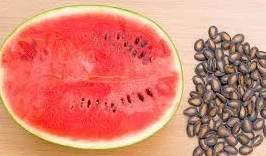Watermelon Seeds Side Effects: What You Should Know

We often overlook the seeds of watermelon as we enjoy its refreshing fruits. These tiny seeds, which are rich in magnesium and good fats, have recently gained more popularity due to the nutritional value they provide. While watermelon seeds have many benefits, you should also be aware of the possible side effects.
The blog discusses who is most susceptible to side effects from eating watermelon seeds, as well as how you can safely incorporate them into your daily diet. Our goal is to ensure you are informed and that you can enjoy the benefits of watermelon seeds without fear.
Is it safe to eat watermelon seeds?
Watermelon seeds can be eaten in small amounts, and they are quite nutritious. Watermelon seeds are a healthy snack when roasted or sprouted. To avoid negative effects, it is important to use them correctly.
You can decide if adding watermelon seeds to your diet is right for you by understanding the possible side effects.
The Side Effects Of Eating Watermelon Seeds
Digestive Discomfort
Digestion discomfort is one of the more common effects that can occur when eating raw watermelon seeds. The outer shell of raw seeds is made up of cellulose and can be difficult to digest. It can cause problems such as:
- Bloating
- Pain in the abdomen
- Constipation
Consuming large amounts of watermelon seed may worsen your digestion symptoms if you suffer from a sensitive stomach or irritable bowel syndrome. If you want to avoid the discomfort of eating raw seeds, consider sprouting or roasting them. This will make it easier for your digestive system.
Also See: How To Reduce Sugar Level Immediately At Home
Cross-reactivity of nuts and allergens
Watermelon seeds aren’t a typical allergen. However, those with allergies to nuts or seeds should be cautious. Those who are allergic to nuts such as cashews and peanuts may also be allergic to seeds. The symptoms of an allergic reaction include:
- The mouth and throat may feel itchy
- Hives and skin irritation
- In severe cases, breathing difficulties can occur
Consult your healthcare provider if you are unsure or suspect that you may have allergies to nuts or seeds before adding watermelon seeds to a meal.
Excessive consumption of food can lead to weight gain.
Watermelon seeds contain a lot of calories despite being nutrient-rich and healthy. The roasted seeds are rich in healthy fats, protein, and fiber. However, consuming too much can quickly add up to a lot of calories. When you are trying to lose weight, the best thing to do is to stick with portion-controlled servings. Serving sizes are typically 1 ounce or 28 grams, which is approximately 150 calories.
Pesticides and Potential Health Harm
Remember that seeds and fruit from watermelons purchased in stores may still have pesticide residues. Untreated seeds can expose you inadvertently to dangerous chemicals if consumed in large quantities. Choose organic watermelons whenever possible, or wash them thoroughly before eating the seeds.
Not Suitable for Young Children
Swallowing unprocessed seeds can be a danger to toddlers and young children. Raw watermelon seeds can lodge in your throat due to their small size and texture. If you are worried about your child choking, always supervise them while eating the watermelon.
Overconsumption and Nutrients: A Risk Factor
Although nutrients such as magnesium, zinc, and iron found in watermelon seeds are good for you, consuming too much of them can cause imbalances. You can, for example:
- A magnesium overload may cause nausea and diarrhea.
- Excess zinc can weaken the immune system.
Enjoying watermelon seeds in moderation will help you maintain a healthy nutrient level.
Also See: 10 Surprising Health Benefits of Betel Leaf (Paan) You Didn’t Know
Watermelon Seeds: Tips for Safe Consumption
Here are some tips to help you minimize the risks associated with watermelon seeds.
Roast the seeds or sprout them
Watermelon seeds are easier to digest when they have been roasted. The outer shell is broken down by sprouting, which increases nutrient absorption.
- Roasting seeds: Mix the seeds in olive oil with salt and bake them at 350 degrees F for 10-15 minutes.
Use moderate serving sizes
Watermelon seeds are best eaten in small quantities. Enjoy a quarter cup of roasted watermelon seeds to get all the nutritional value without adding extra calories.
Check for allergies
Start small when you try watermelon seed for the first. This will ensure that you do not have an allergy reaction. Consult a physician if your symptoms are unusual.
When possible, choose organic
Organic watermelons will give you peace of mind regarding pesticides. The seeds in these watermelons are not contaminated with harmful chemicals. They make a healthier snack.
Serve with other foods
The seeds of watermelon are a great addition to a platter. You can add them to salads or smoothies. They are also great in trail mixes.
Watermelon seeds are not for everyone
Watermelon seeds can be safe in most cases, but you should avoid them if:
- Do you have a family history of allergies to nuts or seeds?
- You may have a sensitive digestive system or gastrointestinal problems.
- Prepare snacks when eating dangers are present.
You can enjoy watermelon seed’s nutritional benefits while putting your health first.
Watermelon seeds: The positive side
Watermelon seeds are a great source of nutrients when eaten correctly.
High Protein Content
It is a good option for vegans and vegetarians as it contains 8 grams of protein per ounce.
High in Nutrients
Watermelon seeds are rich in magnesium, zinc, and iron and can help to support immunity and metabolism, as well as bone health.
Healthy Fats
When consumed in moderate amounts, watermelon seeds contain a good amount of omega-6 fatty acid, a beneficial nutrient for the heart.
Understanding the pros and cons of any food you introduce to your diet will help you make an informed decision. The same is true for watermelon seeds.
Include watermelon seeds in your diet today!
Consuming watermelon seeds with mindfulness can provide a variety of health benefits and add to the nutritional value of your snack. Although their side effects may seem insignificant to most, if you are informed about them and eat them moderately, they can provide the greatest benefits.
Explore our blog page for more health tips and simple diets that will improve your overall well-being. Share this article with your friends to make healthy living accessible for all.



